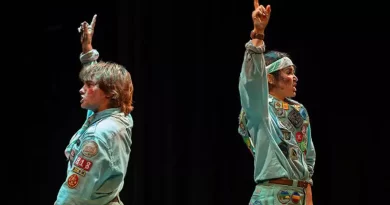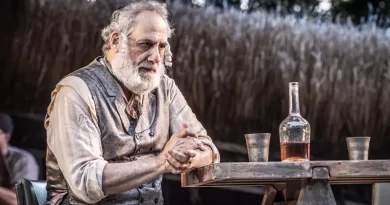“The Cherry Orchard” – Yard Theatre, Hackney
Jeremy Malies in east London
20 September 2022
It’s every sound engineer’s nightmare. How do you create the sound of cherry trees being chopped down when we must hear it from within the house. Ridley Scott famously told us that in space, no one can hear you scream. So the same is probably true for felling a cherry orchard in another galaxy; it will be silent.
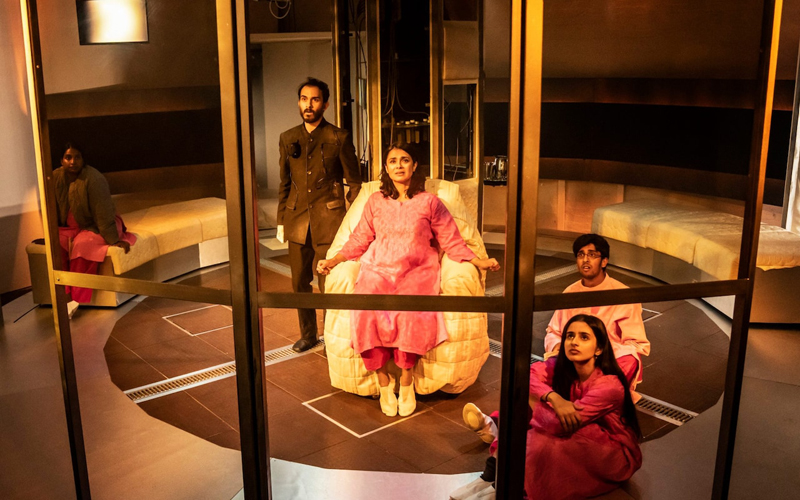
Tripti Tripuraneni, Hari Mackinnon, Anjali Jay, Gavi Singh Chera
and Samar Khan.
Photo credit: Johan Persson.
This production of The Cherry Orchard hitches a ride at warp speed on Chekhov by reimagining the play in outer space. It does so with a great deal of humour and winning self-deprecation from writer Vinay Patel who ensures that the project never takes itself too seriously.
A rare phenomenon this: it’s a concept piece that finds logical momentum for the radical treatment right through the plotline rather than the dispiriting norm which is one brilliant parallel in a single scene followed by a gradual fizzling-out of the central idea.
I’m using character names from the original here rather than the names assigned by Patel for brevity and I hope clarity. Anjali Jay as the spaceship captain and an approximation to Ranevskaya is not only dominant but also luminous and empathetic. Jay acquires detail in her character unobtrusively, finally laying out a credible compound of mother, widow, and commanding officer. I was soon rooting for her to make it to a docking station and tuck into the Indian sweetmeat burfi that she remembers and craves from childhood.
The logic of Patel’s approach here only falters over money. The fulcrum of the original play is that Ranevskaya is hard up but has a logical and face-saving option of allowing part of the estate to become holiday cottages. Lack of money (other than trifling funds to spend in a galactic tuckshop) hardly seems relevant on a spaceship and conflict between Jay and the Lopakhin character (played by Maanuv Thiara) suffers as a result. There is also too large an age gap for Lopakhin to aspire to her romantically though it’s Patel’s prerogative as adaptor to exclude this element. And this is a conscious decision rather than miscasting; the casting here struck me as inspired across the board.
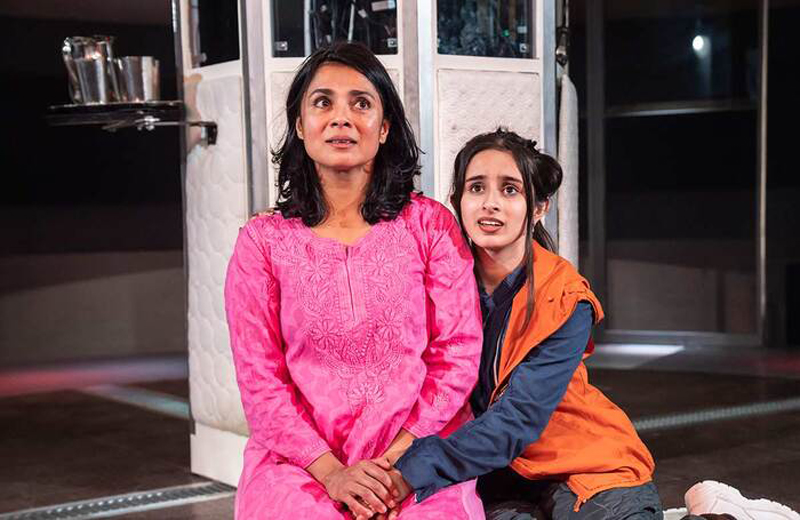
Anjali Jay and Samar Khan.
Photo credit: Johan Persson.
Video by Lewis den Hertog is pedestrian; it could have been more imaginative and technically adept. Film of the cherry blossom was disappointing, and Jay interacting with her drowned son played by Rishaan Patel was formulaic. The controls of the ship (a simple thing to represent these days with onstage computer monitors) are still created with flair by Rosie Elnile, a young designer of great promise whose career has been helped by Jerwood Arts.
Patel’s writing can be evocative and sensual. Director James Macdonald is always alive to this, notably in a wonderful scene in which Samar Khan (Anya) and Gavi Singh Chera (Trofimov, the perpetual apprentice) enjoy an endorphin rush as sunlight (not our own sun you would guess) penetrates their skin. Trofimov (perceptive for once) says that his sweetheart is having a vestigial experience and they are emulating their ancestors. It’s a stimulating and moving moment that had me leaning into the set with interest. I shouldn’t ventriloquize him, but I think Chekhov (a doctor) would have loved these aspects.
At my last The Cherry Orchard I saw Ian McKellen investing the minor role of Firs with emotional light and shade as well as exquisite physical comedy. Here, Hari Mackinnon (only just out of LAMDA where he played the title character in a production of Uncle Vanya) must do things in a more binary way since he plays a robot. And he excels. Along with Jay, his performance is a highlight.
The ship is ageing, and being part of the equipment, Firs is in need of a refit. Mackinnon contributes comic turns as his decrepit motors and circuits fail at vital moments when he is following predetermined instructions. I’m sure that Mackinnon is pretty much the finished article, but Macdonald directs him with great precision for scenes that in less assured hands could prove as flat as the robot’s depleted batteries.
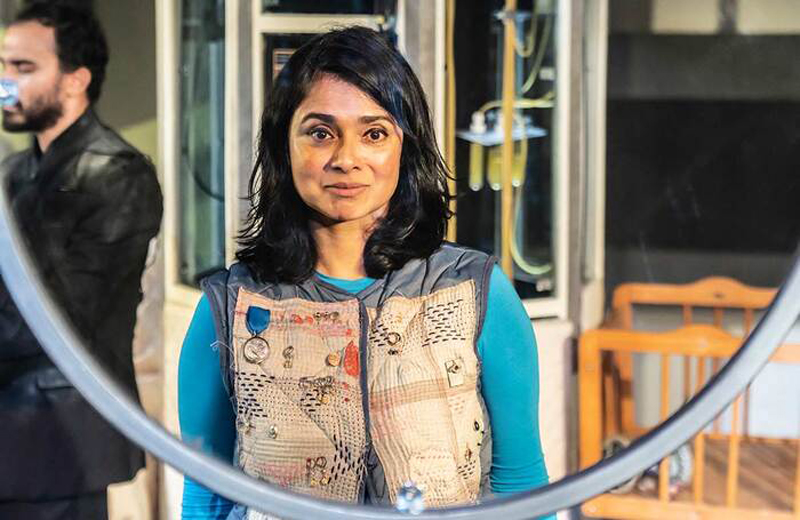
Anjali Jay as Captain Ramesh.
Photo credit: Johan Persson.
Patel’s script introduces ethical questions about use of androids, and again I’d venture that this might be the kind of concern that a present-day Chekhov would be dealing with.
The script is often extremely witty. It’s an important detail that these people (and many generations before them) have been born on the spaceship as test-tube babies or clones. All the cast are Indian, and the best joke of the night sees Trofimov tell Anya that in ancient history there were pale people called Caucasians with skin as white as the current crew members’ teeth!
Other good gags? There is a caste system on the vessel with proles (the ‘Downdeckers’) performing menial tasks as slaves in all but name. Reporting from below decks, one of the officers tells us that the proles are amusing themselves with a rudimentary form of entertainment that they call a “play”.
The Yard Theatre has a revolve that was employed at slow speed. I wondered if it could have been used more imaginatively perhaps for planetary motion. There are some anachronistic props and a few elements that simply need more money spent on them. The captain takes her tea from a bizarre vintage bone china cup, and later she moves around on what is obviously a plain armchair with a throw and a set of distinctly non-space-age castors. Lighting by RADA product Jai Morjaria is suitably clinical, but I felt that both he and Elnile failed with an eclipse scene that might have been revelatory and could have brought the whole theatre through a sequence of light and shade.
Patel’s version is closest to the original in the later stages, particularly the scramble to pack belongings and vacate the ship. The packing culminates with something as obvious as an oncoming comet but still a powerful idea from the writer which is conveyed skilfully by Mackinnon in a scene of great poignancy.
Is there usually a scintilla of hope that Firs might rouse himself, forage for supplies in the house and survive the winter? Here, his chilling fate is not only to be abandoned in the only home he has known but also to drift in space. As they set off to escape in a pod vehicle, the other characters emerge as quite ruthless; it is very Russian, unsentimental, and un-English. And un-Indian for that matter.
This is an impressive project and there is much to admire. It serves the spirit and flavour of the play but not necessarily the message of financial common sense given the lack of conflict between Ranevskaya and Lopakhin. Of course, Patel is under no obligation to follow the plot exactly and “reimagining” above is his word not mine. But with no squabble over territory, and money being a complete irrelevance, the plot as written here never reached critical mass for me.
A minor aspect but gratifying: the programme notes are a single sheet of recycled 40gsm paper. Accustomed to struggling out of West End theatres with enormous glossy brochures resembling a brick, I was pleased to think that neither rainforest nor cherry trees had been felled here.
This production is a joint venture by the Yard Theatre, English Touring Theatre (ETT), and HOME. It will tour to HOME in Manchester in November.



